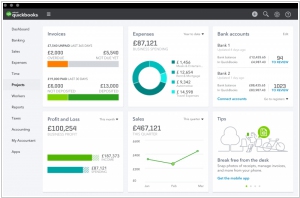NetSuite vs QuickBooks
July 02, 2023 | Author: Michael Stromann
21
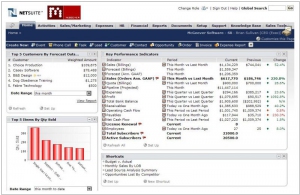
NetSuite is the leading vendor of cloud-based Software-as-a-Service integrated business management software for mid-market enterprises and divisions of large companies. NetSuite's cloud business management system including ERP / accounting, order management / inventory, CRM, professional services automation (PSA), and Ecommerce.
NetSuite and QuickBooks are two popular software solutions used for business financial management, but they differ in their scope and target audience. NetSuite, developed by Oracle, is a comprehensive cloud-based enterprise resource planning (ERP) platform that offers a wide range of modules for financial management, inventory management, order management, customer relationship management (CRM), and more. NetSuite is designed for mid-sized to large enterprises, providing robust features for integrated business management and scalability.
In contrast, QuickBooks, developed by Intuit, is a widely-used accounting software primarily designed for small and medium-sized businesses. QuickBooks offers core accounting features such as bookkeeping, invoicing, expense tracking, and financial reporting. It provides an intuitive and user-friendly interface, making it accessible to users with limited accounting knowledge.
See also: Top 10 Online ERP software
In contrast, QuickBooks, developed by Intuit, is a widely-used accounting software primarily designed for small and medium-sized businesses. QuickBooks offers core accounting features such as bookkeeping, invoicing, expense tracking, and financial reporting. It provides an intuitive and user-friendly interface, making it accessible to users with limited accounting knowledge.
See also: Top 10 Online ERP software
NetSuite vs QuickBooks in our news:
2023. Intuit launches generative AI–powered digital assistant for small businesses and consumers

Intuit, the prominent U.S. financial and accounting software company, has introduced its inaugural customer-centric generative AI-driven solution known as Intuit Assist. Functioning as a digital assistant, it is seamlessly integrated into Intuit's suite of platforms and products, including TurboTax, Credit Karma, QuickBooks, and Mailchimp. With a consistent user interface, Intuit Assist leverages contextual datasets to deliver personalized recommendations to the company's vast customer base of over 100 million small businesses and consumers worldwide. This innovative offering also facilitates human assistance through Intuit's live platform when necessary. The digital assistant was created using GenOS, Intuit's proprietary operating system based on generative AI, which was launched in June to empower developers in incorporating AI across the company's product portfolio.
2020. Intuit acquires inventory management software TradeGecko

Intuit, a US-based business and financial software company, has made a deal to purchase TradeGecko, a Singaporean software-as-a-service company specializing in online inventory and order management software for small businesses. The acquisition, valued at $80 million, aims to combine TradeGecko's inventory and order management capabilities with Intuit's QuickBooks accounting platform. This integration will enable QuickBooks Online customers to effectively launch and oversee products across online and offline sales channels. Additionally, they will be able to handle orders and inventory fulfillment from different channels and multiple inventory locations, as stated in the announcement.
2017. Intuit acquired time-tracker TSheets
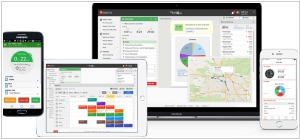
Intuit, the company renowned for products like QuickBooks, has recently made a significant acquisition. They have acquired TSheets, a time-tracking service and employee scheduling app with a customer base exceeding 35,000, for a total of $340 million. Given the substantial overlap in their target markets, primarily catering to small and medium-sized businesses, it's evident that QuickBooks and TSheets complement each other. In fact, Intuit reveals that the two companies already share 12,000 customers, indicating an existing synergy. This acquisition is not primarily aimed at acquiring new customers but rather at enhancing the QuickBooks ecosystem. It's worth noting that TSheets already integrates with QuickBooks. Throughout my discussions with Intuit in recent months, it has become apparent that their current product plans revolve around minimizing friction, particularly in relation to QuickBooks, aligning with their commitment to creating seamless experiences for their users.
2016. Oracle buys cloud ERP provider NetSuite for $9.3B
Oracle has announced its acquisition of NetSuite for an estimated amount of $9.3 billion. As per a statement by Oracle CEO Mark Hurd, both Oracle and NetSuite's cloud service offerings, targeting enterprise customers, will continue to operate and coexist in the marketplace indefinitely. NetSuite, an established player in the cloud enterprise resource planning (ERP) sector, holds a prominent position with its offerings for supply and demand tracking, inventory management, accounting, customer relationship management (CRM), and HR solutions. The ERP industry has witnessed considerable mergers and acquisitions along with consolidation in recent years. Oracle, known for its aggressive acquisition strategy, has been actively acquiring smaller companies throughout 2016, including Opower and Textura.
2014. Intuit acquired cloud integration service ItDuzzit
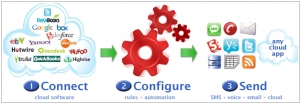
Intuit is further expanding its cloud platform for small and medium-sized businesses (SMB) through the acquisition of itDuzzit, a startup offering integration tools for connecting various web and mobile apps within enterprises. This can be likened to the functionality of IFTTT but tailored for business needs. Intuit's intention is to incorporate itDuzzit into its QuickBooks platform, which not only provides accounting services but also offers a growing range of additional services for businesses. itDuzzit competes with similar platforms like Zapier and Cloudwork. The platform currently supports integration with numerous apps, including Asana, Box, Coinbase, Freshbooks, PayPal, and Shopify, with the promise of adding more apps in the future. In essence, this acquisition allows Intuit to provide its customers with a seamless way to utilize these integrated apps on its platform, alongside Intuit software, even if Intuit doesn't have a direct hand in each of those services.
2014. Intuit buys Lettuce for $30M to add inventory and order management to Quickbooks
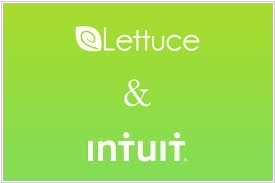
Intuit has expanded its portfolio by acquiring Lettuce, a platform designed for online order and inventory management, aiming to solidify its position as the leading provider of cloud-based office solutions for small and medium businesses. Unlike typical acquisitions where the purchased product is either shut down or its technology repurposed for a new service, Intuit plans to keep Lettuce functioning as an independent application. Additionally, Intuit intends to enhance the integration of Lettuce into its flagship small and medium business accounting product, Quickbooks, building upon the existing integration to provide a more comprehensive solution.
2010. NetSuite fights hairballs. But makes one with Google Apps
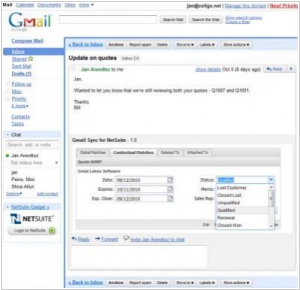
NetSuite marketing team is well known for its sense of humor. But before their humor was mainly inspired by SAP and its "stealth" launch of SaaS solution SAP Business ByDesign (that let NetSuite make its business). By the way, it's interesting that actually NetSuite drives away Oracle's customers as well as SAP's, but with respect to Oracle, the NetSuite marketers behave much more modest, because the Oracle CEO, Larry Ellison in co-owner of NetSuite. But let's go back to hairballs. What is it? According to NetSuite, the hairball - is a thing that happens when a company deploys disparate IT systems and then tries to integrate them. The conclusion is simple - use NetSuite, where everything is natively integrated. In addition to funny video NetSuite unveiled the updated system interface and seamless integration with Google Apps: ***
2009. Netsuite invented Social ERP
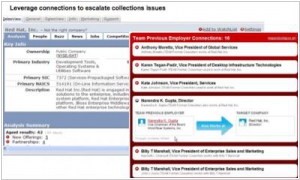
Netsuite has already missed the opportunity to use the Social CRM buzz. Salesforce and some other CRM vendors have already unveiled social features and launched the marketing promotions. But Netsuite has all chances to become the first to offer Social ERP. Today Netsuite and InsideView announced about the new partnership in order to create the Social ERP. But why do we need this social ERP software? Everything was clear with social CRM: salesperson needs to monitor customers and leads in the social networks in order to involve into the discussions and sell something. But why ERP, that is intended for resources accounting and planning, needs the similar features? Netsuite has found some answers to this question. ***
2009. Netsuite connects to SAP
Netsuite has unveiled OneWorld for SAP, a new product that provides SAP customers with the advantages of divisional Software as a Service (SaaS) while consolidating divisional data for aggregate reporting purposes. This solution empowers large enterprises to maintain their existing investments in legacy business applications while implementing a modern, web-based suite of business applications, resulting in cost reduction and increased competitiveness and productivity for their divisions. Netsuite aims to address the needs of multinational corporations by offering a flexible and functional solution that can be rapidly and cost-effectively deployed to business divisions. The company aims to provide software systems that are more adaptable, customizable, and flexible than those offered by the corporate parent company. At the core of this offering is SuiteCloud Connect for SAP, a product and service offering that bridges the gap between Netsuite data and SAP reporting. It enables the aggregation of data such as general ledgers and revenue information into SAP for consolidated reporting purposes.
2009. Netsuite created SuiteCloud Connect for Salesforce.com
NetSuite has announced a collaboration with third-party developers to introduce connectors that integrate its SuiteCloud suite with Salesforce.com CRM apps. These connectors enable users to seamlessly incorporate NetSuite applications into their collection of software as a service (SaaS) applications. SuiteCloud Connect comprises a range of integration applications that combine Salesforce.com's salesforce automation and customer relationship management software with NetSuite's online ERP suite. By establishing this connection, NetSuite aims to facilitate best-of-breed SaaS deployments. The integration with Salesforce.com is a logical step for NetSuite, as Salesforce.com boasts higher annual revenue and a larger user base. By reaching out to an audience already familiar with SaaS solutions, NetSuite expects to attract more customers to its platform.

